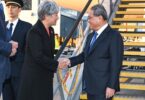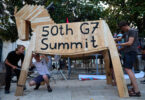The European Commission has said it would impose additional tariffs on electric vehicles (EVs) made in China. It would range from 17.4 per cent on China-made BYD to 38.1 per cent on SAIC, another Chinese EV product apart from the standard 10 per cent duty. The reason given is that these cars were given excessive subsidies.
Interestingly, the share of China’s branded EVs rose from less than 1 per cent in 2019 to 8 per cent and it is expected to rise to 15 per cent in 2025. That is indeed a rapid rise, but it is not clear whether the Commission’s sharp response would solve the problem.
German automakers like the BMW, which have a big market in China, are worried that if China were to retaliate as it said it would, then its exports would be affected. China’s foreign ministry spokesman Li JIan said that the Commission’s decision was nothing but protectionism, the Chinese commerce ministry said that it would take appropriate action.
The commission is investigating the issue of subsidies to the Chinese EVs, and the hike in tariffs is a temporary measure and it will be made permanent for five years when the investigation concludes in November. The commission’s decision to increase tariffs on China-made EVs looks like a knee-jerk response because it is likely to hurt European carmakers, especially the German auto industry, than the Chinese. Germany’s auto exports have a 30 per cent share of the Chinese market. There is also the complication that the tariffs will affect German cars made in China and exported to Europe. The European Commission in its investigation into the subsidies issue has said that the automakers who cooperate in the inquiry would be levied a 21 per cent tariff, while those who do not cooperate will be levied a 38.1 per cent tariff hike. But the Chinese automakers do not seem to be affected by the commission’s tariff salvo.
The Chinese Passenger Car Association (CPCA) Secretary General Cui Dongshu said, “The EU’s provisional tariffs come basically within our expectations, averaging around 20 per cent, which won’t have much of an impact on the majority of Chinese firms. Those exporting China-made EVs that include Tesla, Geely, and BYD still have huge potential for development in Europe in the future.” Chinese EV-makers and suppliers are also looking to set up production units in Europe. Apart from their ideological opposition – democracy versus communism – Europe and America are fighting a part economic war and part political one. They also want to pressure the Chinese economy as a way of discouraging Beijing from giving any substantial aid to Russia in Moscow’s war in Ukraine. Economic sanctions against Russia have not deterred Moscow from continuing to wage war in Ukraine. And raising tariffs against Chinese exports is unlikely to force Beijing to change its Russia policy. It is true that on the economic front, China does pose a challenge to the markets in Europe and America with its cheap goods, including EVs. Raising tariff barriers is one of the ways of protecting domestic markets, but it might not be the most effective way. Europe and America will have to raise their capacity to manufacture efficiently, with reasonably low costs. But that is a tall order for the West. As a matter of fact, it is the West who built up China as an economic giant by transferring their manufacturing to China where the wages were cheap. The West is caught in a trap of its own making. There is also the clear danger that if the Chinese manufacturing capacity were to shrink suddenly, there would be a global economic crisis.







